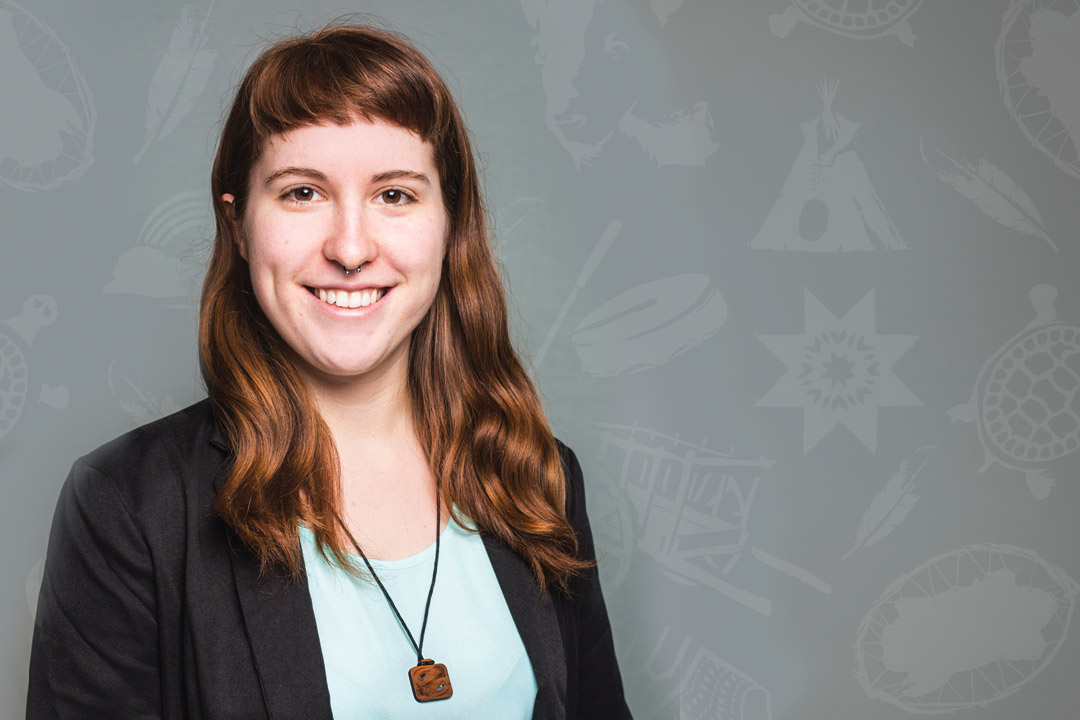
Meet the Aboriginal Student Achievement Award winners: Iloradanon Efimoff
Iloradanon Efimoff has only been in Saskatoon for five months, but she’s already making an impact at the University of Saskatchewan.
By Jordan SherbinoThis week the University of Saskatchewan is celebrating Aboriginal Achievement Week with a range of cultural events, discussion panels, artistic activities and celebrations.
Each year, there is an awards ceremony to honour Indigenous students and to recognize their academic accomplishments, leadership, research endeavours or community volunteerism.
One of the award winners this year is Iloradanon Efimoff—a graduate student in the College of Arts and Science—who is receiving an award for her exemplary leadership.
Iloradanon is Haida and is pursuing a master’s degree through the psychology department. Despite having only been at the U of S for a few short months, she’s made substantial impacts at the university. She is the co-chair of the Indigenous Graduate Students’ Council (IGSC) and is the Aboriginal liaison with the Graduate Students’ Association. Through these roles, she works to collaborate with other Indigenous student groups at the university and she represents the needs of Indigenous graduate students on several committees. She works collaboratively to ensure that the Indigenous student voice is heard throughout the university.
We caught up with Iloradanon to ask her a few questions about what motivates her to get involved and what she hopes to accomplish at the U of S.
What made you interested in coming to school at the U of S?
The U of S is one of the few places in Canada with a graduate-level program in applied social psychology. Having lived in British Columbia my whole life, I wanted to experience somewhere new in Canada.
One of my professors in my undergrad told me I should look into doing my master’s at the U of S—and when I did, one of the first things I noticed was the commitment to Indigenous students. I’m not going to say the U of S is perfect, but there definitely is a thriving Indigenous community on campus—with growing numbers of Indigenous students, staff and faculty—that really left all the other schools I looked at in the dust. I also received the dean’s scholarship, which was great, and my supervisor has experience with Indigenous research.
Why did you get involved in student leadership at the U of S?
I was really involved in student leadership at my undergraduate institution, and really enjoyed it, so I wanted to continue with it. Since my undergrad, and even in high school, I’ve been very interested in human rights and social justice, so my involvement in leadership at U of S is really an extension of that, especially in my roles within the Indigenous community.
What are your goals as co-chair of the Indigenous Graduate Students’ Council (IGSC)?
Through the IGSC we hope to support Indigenous graduate students. The way we do this varies: we hold events to engage students, we share opportunities for scholarships and awards, we connect with staff and administration to discuss the issues impacting Indigenous students, we collaborate with multiple groups on campus to increase Indigenous student representation, we share Indigenous ways of knowing with those who are interested and—quite importantly—we create community on campus to support Indigenous graduate students through peer support.
Something I think is important to mention is that the Indigenous community on campus is a community that is not restricted by year of study—first-year undergrad to final year graduate students use the Gordon Oakes Red Bear Student Centre and connect with each other. We are one large community.
To learn more about the events that are taking place this week, be sure to check out the Aboriginal Achievement Week website.

